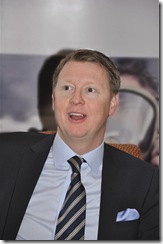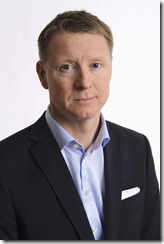Prior to January 1, 2010, the last time that Ericsson saw a change in leader was in 2003, a point where telecom infrastructure companies were reeling from the effects of the award of over-priced 3G licences, which had in fact nearly bankrupted an industry. Less than seven years on and the picture could not be more different as Hans Vestberg assumes the reins of a company with a solid financial base, enviable technology and market leadership positions, and an appetite to defend its dominance
When the former Ericsson president and CEO, Carl-Henric Svanberg assumed the role in 2003, the company was in crisis. With falling sales and deep cuts to staffing levels, Ericsson’s success as the leading infrastructure supplier had turned into its greatest weakness as its position meant it was far greater exposed to the significant market downturn of the time. Cutting with the tradition of promoting from within, Ericsson looked outside of the vendor to find Svanberg, who had been CEO of a lock-making firm.
Svanberg’s six plus years running Ericsson saw the company undergo a dramatic shift in fortunes, rebounding the with general telecom trend of the latter part of the last decade, and establishing the company as a consistently strong player in a notoriously competitive market. Just consider the fortunes of standalone companies such as Alcatel, Lucent, Nokia and Siemens; and their requirement to consolidate in order to survive the crunching pressures of the market.
Incoming president and CEO, Hans Vestberg is the embodiment of Ericsson’s zest. Often seen as company of quiet competence in which humility is valued above bravado, Vestberg, just shy of his 45th birthday is young, dynamic and full of ideas and energy. He also harks back to the Ericsson tradition of recruiting its leader from within its own ranks, Vestberg being a 20-year veteran of the company.
Vestberg is generous regarding the exploits of his predecessor. “So when I look at Ericsson today and what I plan for the future I think it is more about [perpetuating] the continued development that we have started within Ericsson, but we always need to acknowledge what has happened in the six years since Carl-Henric took over is amazing,” Vestberg said. “I believe we will change quickly in the years to come as well, given the pace of change in the industry, and I think overseeing that will be much of my focus.”
Drilled down to its core, Vestberg’s mandate has three pillars. “We are looking to exploit and execute on what we have in our portfolio; continue our leadership in the industry and then see that our joint ventures continue to get on the right track.”
With respect to “exploiting and executing” on what Ericsson already has in its portfolio, the company has been able to establish itself at the top of the pile with respect to the global telecom infrastructure sector, which is no mean feat for an independent organisation. Ericsson has dominated 2G and 3G infrastructure sales, and is poised to translate that success to the nascent LTE infrastructure market.
“We continue to be the technology leader in wireless communications and that’s a very important piece in our offering,” Vestberg commented. However, in the past three-five years Vestberg describes how Ericsson has also been developing its service offering, as a way to grow even closer to its network operator client base and up-sell its hardware portfolio.
Ericsson has also made inroads into the area of IP with acquisitions such as Redback, the Silicon Valley broadband platform provider in late 2006, and Vestberg believes further opportunistic acquisitions are likely as the opportunities present themselves. Multimedia is an additional area in which Ericsson has been placing a lot of emphasis, and which the company believes rounds off an especially compelling telecom infrastructure and services proposition.
“We have a long history in telecom and in that strategy what I need to take forward is of course the continuation of the development and market leadership; and combine that with our other assets in order to develop even better offerings for our customers, because think about the challenges our customers face,” Vestberg said. “They have growth in networks from people calling more or from data, so they need better technologies that can take care of that. We are in the number one space to develop these capabilities.”
Ericsson’s managed services are helping drive efficiencies for operators, an area of the business that Vestberg describes as, “coming out quite nicely”. And with network operators looking to squeeze incremental revenue from their legacy and NGN infrastructure, Vestberg is keen to see the company work ever more diligently in the area of multimedia offerings, with all that is needed to enable operators to offer other new services, and bring them quickly to market. Ericsson has also established competence in billing systems and service delivery platforms.
Vestberg believes it is essential for Ericsson not to hesitate on the question of leadership, meaning the vendor is prepared to invest more on R&D if it is so needed, and is prepared innovate with its customers till demands are met.
“We have been around for 134 years and are present in 175 countries, we need to continue to maintain that legacy but still be able to innovate and develop the company,” Vestberg commented.
And while Ericsson is in a markedly stronger competitive and financial position than it was in 2003, today’s market conditions remain challenging. The vendor reported group sales for Q110 to end-March declined nine per cent year-over-year with lower sales in its network division, but slightly higher sales in its services unit. Net income was down 30 per cent year-on-year, but up 76 per cent quarter-on-quarter, with Vestberg admitting that the market conditions the vendor experienced in H209 prevailed in Q110, with the quarter experiencing mixed operator investment behaviour across regions and markets.
“During 2009, it took three quarters before we witnessed softening in our infrastructure business, which meant in Q3 and Q4 2009 we witnessed some negative impact on our infrastructure business,” Vestberg said. “The reason for that is we still had certain markets that grew by 100 per cent in Q4 where others were down 70 per cent, so the overall impact was flat sales in a year when business in general was deeply affected. That is the advantage of being in 175 countries.”
Vestberg squashed speculation that Ericsson has any plans to abandon its devices joint venture with Sony, and says the vendor remains equally committed to ST-Ericsson, its semiconductor joint venture.
Narrowing in on the MEA, Vestberg confirms the region remains of strategic importance to Ericsson, though it has been heavily hit by the global economic slowdown. “We have to be honest that some markets in Middle East, Asia and Africa are the slower ones, but they have been growing rapidly before and are a little slower right now,” Vestberg conceded.
“We have a long history in the MEA region. It is an important region for expansion and technology investment. Pan-regional operators are present as well, so it is important to be strong and present here. We shall continue to invest in the region,” Vestberg concluded.
Vestberg’s rise to the top
Hans Vestberg has been president and CEO of Ericsson since January 1, 2010.
He had been CFO from October 25, 2007, until the end of 2009. He was named executive VP in 2005 while serving as head of Business Unit Global Services, an office he held since 2003.
From 2002 to 2003 he served as president of Ericsson in Mexico.
Between 2000 and 2002, Vestberg was CFO for Ericsson in North America and Ericsson’s controller for the Americas. Between 1998 and 2000, he was CFO of Ericsson in Brazil.
Since joining Ericsson in 1991, Vestberg has also held various managerial positions in China, Sweden, Chile and Brazil.
Vestberg was born in Hudiksvall, Sweden. He earned a Bachelor of Business Administration degree from the University of Uppsala, Sweden, in 1991.





0 comments ↓
There are no comments yet...Kick things off by filling out the form below.
Leave a Comment